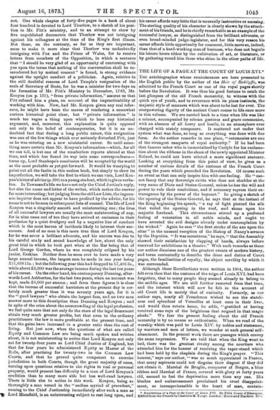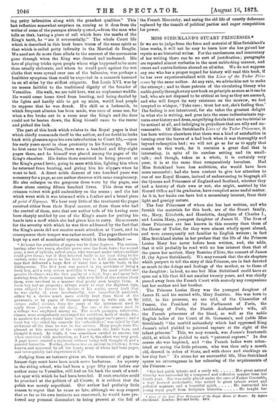THE LIFE OF A PAGE AT THE COURT OF LOUIS
XVI.* THE autobiographer whose reminiscences are here presented to the English public by the author of the Heir of Redclyffe, was. admitted to the French Court as one of the royal pages shortly, before the Revolution. It was thus his good fortune to catch the last glimpses of the old French monarchy, to witness with the- quick eye of youth, and to reverence with its pious instinct', the majestic style of manners which was about to be lost for ever. The- overpowering dignity of the ancient Court comes to life once more in this volume. We are carried back to a time when life was like a minuet, accompanied by solemn gestures and grave ceremonies, with an absence of all hurry and bustle, in an atmosphere ever- charged with stately composure. It mattered not under that system what was done, so long as everything was done with due- form. As the author remarks in one place, "ceremonies are one of the strongest ramparts of royal authority." If he had been that famous usher who is immortalised by Carlyle for his exclama- tion about the ribbons in the shoes of the newly appointed Minister Roland, he could not have uttered a more significant sentence.- Looking at everything from this point of view, he gives us a number of curious details of the customs of the French Court during the years which preceded the Revolution. Of course such an event as that can only inspire him with one feeling. He "can- not fancy that any Sovereign exists who does not shudder at the very name of Diets and States-General, unless he has the will and power to rule their resolutions, and if necessary repress their ex- travagance by the power of the bayonet." In giving a sketch of the opening of the States-General, he says that at the instant of- the King beginning his speech, "a ray of light pierced the silk that veiled the opening in the roof, and shone upon his majestic forehead. This circumstance stirred up a profound feeling of veneration in all noble minds, and ought to- have arrested the evil designs already under contemplation by the wicked." Again he sees "the first stroke of the axe upon the- altar" in the unusual reception of the Bishop of Nancy's sermon by the Deputies. "It was monstrous," he says, " that the Assembly showed their satisfaction by clapping of hands, always before reserved for exhibitions in a theatre." With such remarks as these- our author dismisses one of the greatest events of modern history, and turns contentedly to describe the dress and duties of Court pages, the familiarities of royalty, the abject servility by which it was surrounded.
Although these Recollections were written in 1804, the author felt even then that the customs of the reign of Louis XVI. had been forgotten, that to many people they seemed already to belong to- the middle ages. We are still further removed from that time, and the interest which will now be felt in the account of old Court life is merely that of curiosity. Formerly, as our author says, nearly all Frenchmen wished to see the stateli- ness and splendour of Versailles at least once in their lives, and would then return home, he adds, "gratified at having received some rays of the brightness that reigned in that magic abode." We fear the present feeling about the old French monarchy is by no means so enthusiastic. When we read of the worship which was paid to Louis XIV. by nobles and statesmen, by warriors and men of letters, we wonder at each general self- abasement. In the present work there are passages which convey the same impression. We are told that when the King went to bed, there was the greatest rivalry among the courtiers who him for the honour of receiving the taper-stand which had been held by the chaplain during the King's prayer. "This honour," says our author, "was so much appreciated in France, that many aspirants could not disguise their disgust if they did not obtain it. Marshal de Broglie, conqueror of Bergen, a blue ribbon and Marshal of France, covered with glory at forty years old, seemed to feel the deprivation more than any one. His blushes and embarrassment proclaimed his cruel disappoint- ment, so incomprehensible is the heart of man, contain- • Resoltedions of a Page at the Court of Louis XVI. By Felix Count d'Hiaeoquen. Edited from the French by Charlotte M. Tongs. London: Hurst and Blackett. Haw.
ing petty infirmities along with the grandest qualities." This last reflection somewhat surprisee us, coming as it does from the writer of some of the passages already quoted,—from the man who tells us that, having a piece of roll which bore the marks of the King's teeth, he "ate it reverentially." The whole Court life which is described in this book bears traces of the same spirit as that which is called petty infirmity in the Marshal de Broglie. We need not do more than allude to the account of the ceremonies gone through when the King was dressed and undressed. His love of playing tricks upon people whose wigs happened to be more than usually elaborate, and whom be would push against the wet cloths that were spread over one of the balconies, was perhaps a healthier symptom than could be expected in a monarch hemmed in on all sides by the stiffest etiquette. But Louis XVI. was by no means faithful to the traditional dignity of the founder of Versailles. His walk, we are told here, was an unpleasant waddle. He would come home tired from hunting, and being dazzled by the lights and hardly able to get up stairs, would lead people to suppose that he was drunk. His skill as a locksmith, to which frequent allusion has been made, was once of some use, for when a fire broke out in a room near the King's and the door could not be beaten down, the King himself came to the rescue and picked the lock.
The part of this book which relates to the Royal pages is that which chiefly commends itself to the author, and no doubt he looks back with pleasure upon his own introduction to Court life,—upon his early years spent in close proximity to his Sovereign. When be first came to Versailles, there were a hundred and fifty-eight pages there, and he himself was placed among the pages of the King's chamber. His duties there consisted in being present at the King's grand levee, going to mass with him, lighting him when be returned from bunting, and giving him his slippers when he went to bed. A direct noble descent of two hundred years was necessary for a page, as our author observes with some complacency. He also enlarges on the gorgeous dress worn by the pages, one dress alone costing fifteen hundred lines. This dress was of crimson velvet with gold embroidery on the seams ; and the hat which went with it was trimmed with a feather and a broad piece of point d'Espagne. We hear very little of the treatment the pages received either from their Royal master, or from those who had the control of them, save that our author tells of his having once been sharply scolded by one of the King's aunts for putting his hands into a muff which she had given him to carry. He accounts for the severity with which he was thus addressed by the fact that the King's aunts did not receive much attention at Court, and in consequence their temper was rather soured. The pages themselves kept up a sort of monitorial system which is thus described :—
"At home the gradation of pages was by three degrees. The seniors, having, after two years, absolute power over the fresh boys; the second year, a sort of hybrids, called seinis, who were not under orders, neither could give them ; but if they behaved badly in the least thing to the seniors, order was given to the fresh boys to hold them under eight taps that delivered a large flow of water into a marble basin in the dining-room. The first year was passed in the noviciate of being a fresh boy, and a very severe noviciate it was! The most perfect and passive obedience was the first quality of a fresh boy ; and many lads arriving from their country homes with very little of this notion about them, were received in a manner that pretty soon taught them. A fresh boy had no property ; always ready to obey the slightest sign, even obliged to foresee the desires of his senior, every fault that he was guilty of, even involuntarily, was immediately punished, either by a decree much more strictly kept than those of the governors, or by pages of Gorman grammar to write out, or by stripes called so vales, from the name of the instrument used to apply them [carafe, an old shoe]. Not one of the names used in a college was employed among us. The words passages, refectories, classes, were scrupulously exchanged for corridors, halls of study, &c.; to mention the others would have been to endanger one's peace ; and a fresh boy who called his comrade his schoolfellow,' was called by that nickname all the time he was in the service. Many people were dis- pleased at this severity of the seniors towards the fresh boys, and thought it cruel. In truth, it WAS sometimes carried to excess; but when exercised with moderation, as I saw it, the effect was very good. A page never entered a regiment without being well thought of, and a general favourite. Besides, freshness was an ancient institution; it was known and approved by all the beads, many of whom had been pages, and consequently had experience of it."
Judging from an instance given us, the treatment of pages in former days must have been much more barbarous. An equerry in the riding school, who had been a page fifty years before our author came to Versailles, still had on his back the mark of a red- hot spur with which he had been branded. If such cruelties could be practised at the politest of all Courts, it is evident that the polish was merely superficial. Our author had probably little reason to regret that he came so late, although we may suspect that so far as his own instincts are concerned, he would have pre-
ferred any personal discomfort to being present at the fall of Strickland: London: Bell and Daldy. 1872.
the French Monarchy, and seeing the old life of courtly deference replaced by the tumult of political parties and eager competition for power.































 Previous page
Previous page